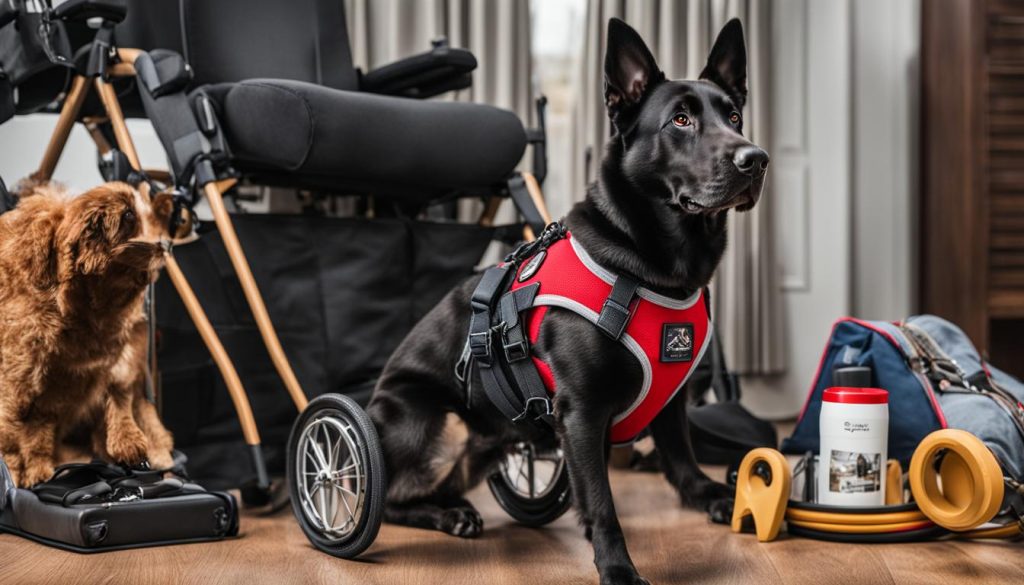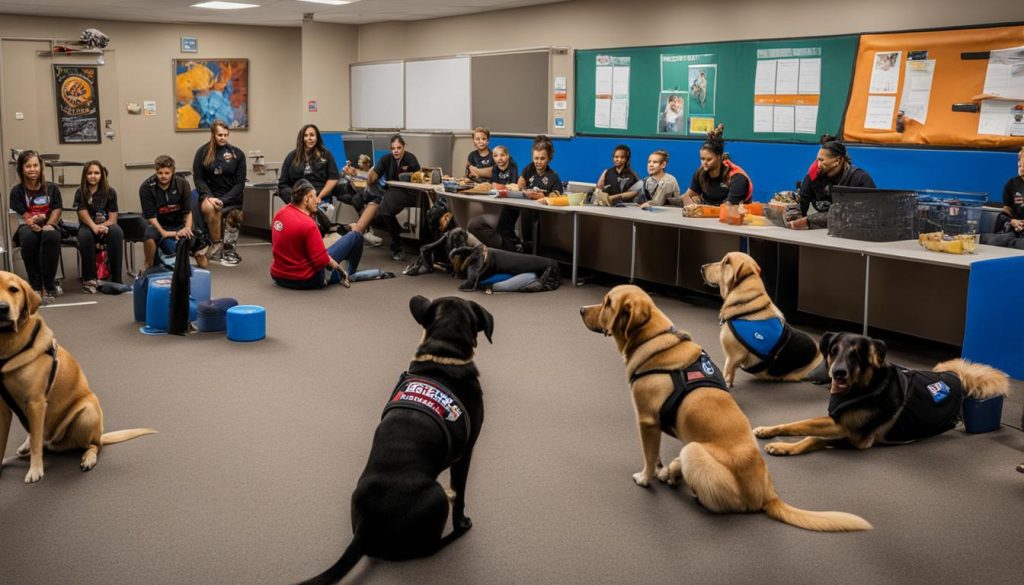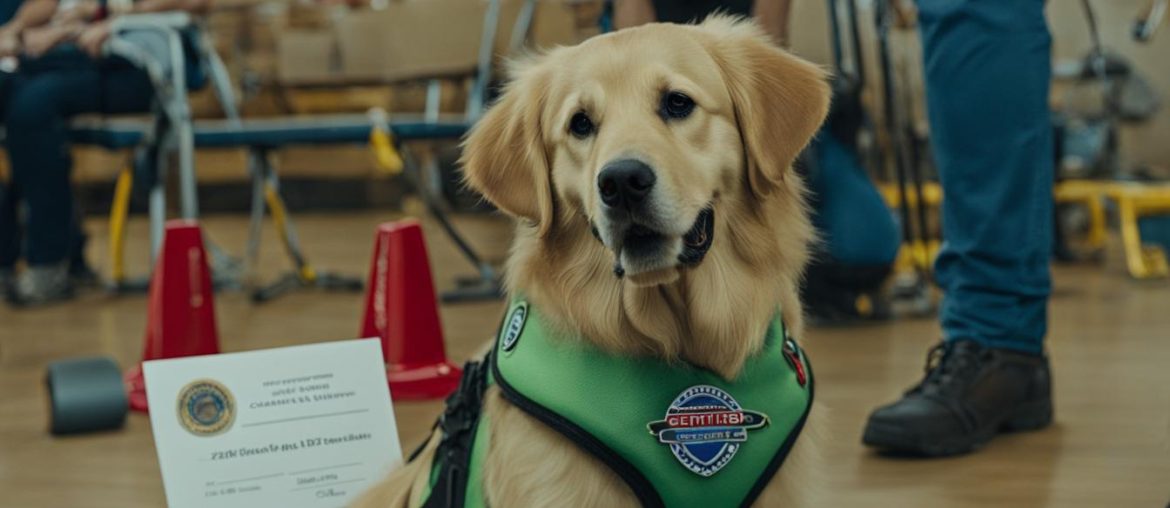To become a service dog trainer in the US, there are no legally mandated standards or certifications. However, formal training is highly recommended. While anyone can start their own dog training business or organization, it is advisable to seek some form of formal training. Bergin University is a highly reputable school for service dog training education. The Association of Professional Dog Trainers and the Certification Council for Professional Dog Trainers (CCPDT) are also valuable resources for aspiring service dog trainers.
Key Takeaways:
- Formal training is highly recommended for becoming a service dog trainer in the US.
- Bergin University, the Association of Professional Dog Trainers, and the Certification Council for Professional Dog Trainers (CCPDT) are valuable resources for aspiring service dog trainers.
- There are no legally mandated standards or certifications to become a service dog trainer.
- Seeking formal training enhances credibility and expertise in the field.
- Consider pursuing a service dog training certification from reputable organizations.
The Role of Service Dogs and the ADA

Service dogs play a crucial role in assisting individuals with disabilities in their daily lives. These highly trained dogs are more than just pets; they are trained to perform specific tasks that aid their disabled handlers. The Americans with Disabilities Act (ADA) protects the rights of disabled individuals to use their service dogs in public spaces without facing unnecessary barriers or discrimination.
While there are no specific requirements for certifications or training of service dogs, individuals are allowed to train their own service dogs. However, many choose to enroll in service dog training programs or courses to receive formal training in order to ensure their dog is properly prepared for the necessary tasks. These programs provide in-depth knowledge on how to train service dogs and cover topics such as obedience training, task training, and handling public access situations.
“Service dogs not only provide physical assistance but also emotional support and independence to individuals with disabilities. They can perform tasks such as retrieving objects, opening doors, or even alerting their handlers to potential medical emergencies. The training process is rigorous and requires patience, consistency, and dedication from both the handler and the dog.”
By undergoing these training programs, aspiring service dog trainers gain the skills and knowledge needed to effectively train and handle service dogs. These programs teach trainers to understand the unique needs of individuals with disabilities, as well as the behavioral cues and techniques required to train service dogs to perform their tasks accurately and reliably. With the knowledge gained from these programs, service dog trainers can make a meaningful impact in the lives of disabled individuals and help them achieve greater independence and quality of life.
Service Dog Training Programs
If you’re interested in pursuing a career in service dog training, there are various service dog training programs available. These programs provide a structured curriculum and hands-on training experience to equip individuals with the necessary skills to become successful service dog trainers. Some well-known programs include:
- Bergin University: Offers a comprehensive service dog training program that covers topics such as obedience training, task training, and public access training.
- Association of Professional Dog Trainers: Provides resources and educational opportunities for aspiring service dog trainers.
- Certification Council for Professional Dog Trainers (CCPDT): Offers certifications for dog trainers, including a specialized certification for service dog trainers.
By enrolling in these programs, individuals can gain the knowledge and credentials needed to excel in the field of service dog training and make a positive impact on the lives of both dogs and their disabled handlers.
| Program | Description |
|---|---|
| Bergin University | A comprehensive service dog training program that covers topics such as obedience training, task training, and public access training. |
| Association of Professional Dog Trainers | Provides resources and educational opportunities for aspiring service dog trainers. |
| Certification Council for Professional Dog Trainers (CCPDT) | Offers certifications for dog trainers, including a specialized certification for service dog trainers. |
These service dog training programs offer valuable resources and guidance for individuals interested in pursuing a career in service dog training. They provide the necessary knowledge and skills to train service dogs effectively and make a positive impact on the lives of disabled individuals.
The Rewards of Being a Service Dog Trainer

Becoming a service dog trainer is a rewarding career that allows individuals to make a positive impact on the lives of people with disabilities. As a service dog trainer, I have the opportunity to work with various organizations, including assistance dog schools, veterans with PTSD programs, and individuals with specific disabilities.
The demand for service dogs is rapidly increasing, which translates to potential career growth and job opportunities in this field. According to Zippia, the salary range for a service dog trainer is between $23,000 to $49,000 per year, providing a stable income while doing meaningful work.
Working as a service dog trainer requires a deep understanding of dog behavior and obedience training techniques. It also demands patience, empathy for dogs, and the ability to adapt training methods to different situations. Communication skills are crucial when working with clients and their service dogs, ensuring effective training and a positive experience for both.
While the reward of helping individuals with disabilities is undoubtedly fulfilling, the constant growth and development in this field make it an exciting career choice. Being a service dog trainer means being part of a community that continually strives to improve the lives of people in need through the power of well-trained service dogs.
The Importance of Service Dog Training

Service dog training is crucial to ensure that the dogs can perform their tasks effectively and safely. While there are no specific certifications required, obtaining professional certifications as a dog trainer can enhance credibility and demonstrate expertise in the field. Formal training and education provide a comprehensive understanding of dog behavior, obedience training, specific task training, and working with individuals with disabilities.
By undergoing service dog training certification programs, trainers gain valuable knowledge and skills that enable them to address the unique needs of service dogs and their handlers. This includes learning how to train dogs to perform tasks such as retrieving objects, providing medical alerts, and assisting individuals with mobility or psychiatric conditions.
The professional dog trainer certification also equips trainers with the ability to assess and evaluate the temperament and suitability of dogs for service work. This ensures that the dogs chosen for service dog training have the right temperament, intelligence, and physical abilities to succeed in their roles. It also allows trainers to tailor their training methods and approaches to meet the specific needs of each dog and handler pair.
Overall, service dog training certification plays a vital role in ensuring the highest standards of service dog training and the well-being of both the dogs and the individuals they serve. Trainers who have undergone formal training and obtained professional certifications are better equipped to provide effective training, support, and guidance to service dogs and their handlers.
The Process of Training a Service Dog

Training a service dog is a detailed and complex process that requires a deep understanding of dog behavior and specific training techniques. The training typically begins when the dog is a few months old and has already received basic obedience training. The first step in training is socialization, where the dog is exposed to various environments, people, and animals to ensure they are comfortable and well-behaved in different situations.
Once the foundation of obedience and socialization is established, the dog can move on to learning specific tasks based on the individual’s disabilities. These tasks can include retrieving objects, providing medical alerts, assisting with mobility, or supporting individuals with psychiatric conditions. Consistency, positive reinforcement, and patience are essential during this training phase to reinforce desired behaviors and ensure the dog is reliable in performing their tasks.
Living with a service dog requires ongoing training and maintenance. The handler must continue to reinforce the dog’s training, provide regular exercise, and ensure the dog’s well-being. It is crucial to create a strong bond between the dog and handler to enhance trust and reliability. The handler must also be aware of public etiquette and educate others on how to interact appropriately with a service dog. By following proper training and care protocols, service dogs can continue to assist individuals with disabilities effectively.
“Training a service dog is a detailed and complex process that requires a deep understanding of dog behavior and specific training techniques.”
| Training Steps | Description |
|---|---|
| Socialization | Expose the dog to various environments, people, and animals |
| Foundation Training | Establish basic obedience and good behavior |
| Task-Specific Training | Teach the dog specific tasks based on individual disabilities |
| Consistency and Reinforcement | Consistently reinforce desired behaviors using positive reinforcement |
| Maintenance and Public Etiquette | Continued training, care, and educating others on interacting with a service dog |
Training a service dog requires dedication, patience, and a deep understanding of dog behavior. It is a process that involves building a strong bond between the dog and handler, teaching specific tasks, and ensuring the dog’s well-being. By following proper training protocols and providing ongoing care, service dogs can assist individuals with disabilities in leading more independent and fulfilling lives.
Required Skills and Traits for Service Dog Trainers

Being a successful service dog trainer requires a unique set of skills and traits. These qualities are essential for effectively training service dogs and helping individuals with disabilities improve their quality of life.
Patience and Empathy
Service dog trainers must have a high level of patience and empathy for dogs. Training service dogs can be a challenging process, and it requires a calm and patient approach. Trainers need to understand that each dog is unique and may require different training methods and timelines. Empathy is also crucial in understanding and meeting the needs of individuals with disabilities.
Strong Communication Skills
Good communication skills are vital for service dog trainers. They need to effectively communicate with clients, colleagues, and the dogs themselves. Clear and concise instructions help ensure that the dogs understand what is expected of them. Additionally, trainers may need to provide guidance and support to dog owners, helping them understand the training process and establish a strong bond with their service dogs.
Knowledge and Expertise
Service dog trainers should have a strong understanding of dog behavior, training techniques, and specific tasks required for service dogs. They should continuously update their knowledge and stay informed about the latest advancements in service dog training. Formal education and certification programs, such as a service dog trainer course, can provide the necessary foundation and expertise for success in this field.
Overall, service dog trainers play a vital role in improving the lives of individuals with disabilities. With the right combination of skills, knowledge, and empathy, they can make a positive impact and create lasting partnerships between dogs and their owners.
The Service Dog Trainer Program at Animal Behavior College

When it comes to service dog training programs, Animal Behavior College offers a comprehensive and reputable option for aspiring service dog trainers. Our Service Dog Trainer Program covers all the essential aspects of training and prepares individuals for a successful career in this field. Whether you’re a dog lover looking to make a meaningful impact or a professional dog trainer seeking specialization, our program can provide you with the necessary knowledge and skills.
Our program curriculum includes a wide range of topics, starting from the history and importance of service dogs to the specific training techniques required for different tasks. You will learn about canine health, obedience training, and how to work effectively with service dog clients. By the end of the program, you will be equipped to train service dogs and assist individuals with disabilities in improving their quality of life.
“The Animal Behavior College Service Dog Trainer Program has provided me with invaluable knowledge and hands-on experience. The curriculum is well-structured and taught by experienced professionals. I would highly recommend this program to anyone aspiring to become a service dog trainer.”
– Sarah Thompson, ABC Certified Service Dog Trainer
Program Highlights:
- Comprehensive training on service dog history, health, and training techniques
- In-depth understanding of obedience training and specific task training
- Practical experience working with service dog clients
- Opportunity to earn a professional certification as an ABC Certified Service Dog Trainer
- Potential career opportunities in assistance dog organizations and related fields
Investing in your education and obtaining professional dog trainer certification can significantly enhance your career prospects in the service dog training industry. With Animal Behavior College’s Service Dog Trainer Program, you can gain the necessary skills and knowledge to excel in this rewarding field and make a positive impact on the lives of individuals with disabilities.
Job Prospects and Salary
Becoming a service dog trainer not only allows me to follow my passion for working with dogs but also provides me with an opportunity to make a meaningful difference in the lives of people with disabilities. The demand for service dogs is rapidly growing, creating a favorable job market for service dog trainers. According to Kaiser Health News, there are currently approximately 500,000 active service dogs in the US, while over 61 million people have disabilities. This demand is expected to continue to rise, offering numerous career opportunities in the field.
As a service dog trainer, I can expect to earn a salary ranging from $23,000 to $49,000 per year, according to Zippia. The salary may vary based on factors such as location, experience, and the type of organization or clientele I work with. While the salary range may not be as high as some other professions, the rewards of this career extend beyond financial compensation. The fulfillment I gain from knowing that I am improving the lives of individuals with disabilities is priceless.
Table: Service Dog Trainer Salary Comparison
| Type of Organization | Salary Range |
|---|---|
| Non-profit organization | $23,000 – $35,000 per year |
| Assistance dog training school | $30,000 – $45,000 per year |
| Private training business | $35,000 – $49,000 per year |
While the salary may vary based on the type of organization I work for, service dog trainers who are passionate about their profession find the work to be incredibly rewarding. The opportunity to witness the transformative impact of service dogs on individuals with disabilities is unmatched. This career allows me to combine my love for dogs with my desire to make a positive impact on the world.
Wrapping Up
As a service dog trainer, I understand the importance of formal training and certification in this field. While there are no legally mandated requirements, obtaining service dog training certification can provide aspiring trainers with the necessary knowledge and skills to excel in their careers.
There are several service dog training programs available that offer comprehensive education on topics such as obedience training, specific task training, and working with clients. These programs equip individuals with the expertise to train service dogs effectively and make a positive impact on the lives of people with disabilities.
By pursuing a career as a service dog trainer, individuals have the opportunity to contribute to the growing demand for service dogs in the United States. The rewarding nature of this profession, coupled with the potential for career growth, makes it an attractive choice for dog lovers who want to make a difference.
FAQ
Are there any legally mandated standards or certifications to become a service dog trainer in the US?
No, there are no legally mandated standards or certifications. However, formal training is highly recommended.
Can anyone start their own dog training business or organization?
Yes, anyone can start their own dog training business or organization.
Where can I seek formal training in service dog training?
Bergin University is a highly reputable school for service dog training education. The Association of Professional Dog Trainers and the Certification Council for Professional Dog Trainers (CCPDT) are also valuable resources for aspiring service dog trainers.
What rights do disabled individuals have in using their service dogs in public spaces?
The Americans with Disabilities Act (ADA) protects the right of disabled individuals to use their service dogs in public spaces without facing unnecessary barriers.
Can individuals train their own service dogs?
Yes, individuals are allowed to train their own service dogs.
What are the specific tasks that service dogs are trained to perform?
The specific tasks that a service dog will perform depend on the individual’s disabilities and can include retrieving objects, providing medical alerts, and assisting individuals with mobility or psychiatric conditions.
What skills and traits are important for a service dog trainer?
Patience, empathy for dogs, a deep understanding of service dogs, good communication skills, and the ability to adapt training methods are essential for a service dog trainer.
What is the Service Dog Trainer Program at Animal Behavior College?
The Service Dog Trainer Program at Animal Behavior College provides comprehensive training for individuals aspiring to become service dog trainers, covering various aspects of service dog training and offering a professional certification as an ABC Certified Service Dog Trainer upon completion.
What is the salary range for a service dog trainer?
The salary range for a service dog trainer is between $23,000 to $49,000 per year, according to Zippia.






